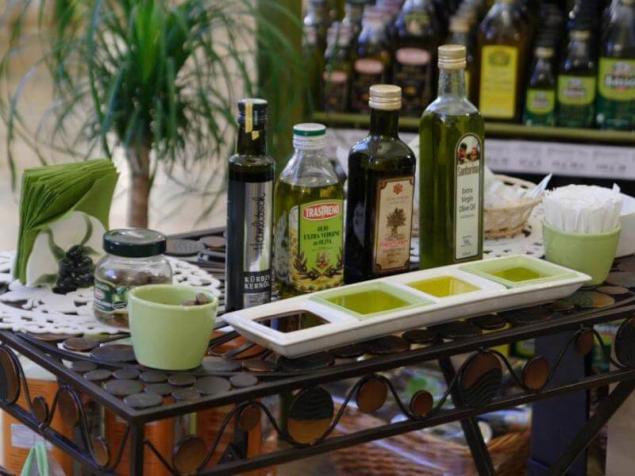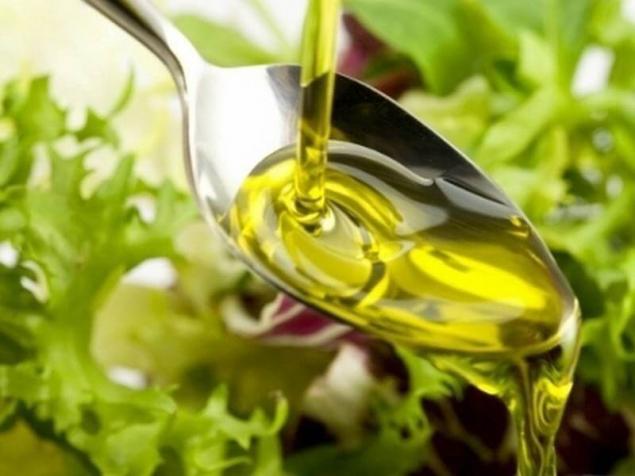1009
Poison in your pan! Stop cooking on vegetable oil!
Two well-known British expert on health issues published in the Daily Mail newspaper the articles about the dangers of the use of vegetable oils for cooking. It is a well-known cardiologist and author of many scientific papers, as well as one of the leaders of the movement for a healthy diet, Dr. Asim Malhotra and popular science journalist Michael Moseley, the author of the acclaimed diet "5: 2." We have translated the basic provisions of their publication.

Asim Malhotra begins his article by saying that, coming to your favorite Indian restaurant, he had to ask the waiter to him curry cooked with ghee "ghee" instead of vegetable oil.
"As a cardiologist with great interest to the issues of obesity and heart health, I am not for that I would not put their health at risk by eating poisonous compounds that are formed when vegetable oils are heated to a high temperature," - he writes. But, unfortunately, curry lovers in the UK, and on the Indian subcontinent are doing just that, abandoning the traditional ghee in favor of "healthy" vegetable oils.
The consequences of this catastrophic trend - the growth of obesity, heart disease, Type II diabetes and cancer. Studies show that sunflower, corn and other vegetable oils when heated easily break down into toxic aldehydes that, among other things, is associated with an increased risk of developing cancer.
A recent study showed that after 20 minutes of frying in vegetable oil aldehyde level 20 times greater than the maximum according to the WHO recommendations.
Human Kind, I try to lead a healthy lifestyle and roasting while healthy foods in oil, causing Asim Malhotra despair how much harm can bring us sometimes good intentions. For years we have been taught that the vegetable oils, including sunflower and corn, much better than butter and animal fats. But now researchers opinion is changing, as Modern scientific studies have shown that dairy products actually protect us from heart disease and type 2 diabetes. Unfortunately for the millions of people who refused to butter and milk fat, because they considered them harmful, the news came too late.
Olive oil first cold press can actually be good for the heart and contains antioxidants that counteract free radicals in the blood. But the majority of vegetable oils will not help, despite claims that they reduce cholesterol. A recent analysis published in the journal BMJ showed that lowering cholesterol by a diet rich in vegetable oil and margarine does not give benefits for heart health and is especially concerned contributes to overall mortality.
Dr. Asim Malhotra always advises his patients to avoid all industrially produced vegetable oils and recommended for cooking butter and ghee.
Michael Moseley describes the study on the chemical composition of the oil changes, subjected to heat. It is believed that major changes occur when the oil temperature of the so-called point fuming. That's why most experts advise not fry in olive oil first cold pressed (point fuming 160-190 C °) and a advises to use, for example, refined sunflower oil (225 ° C) or corn (230 C °).
To test this assertion, the volunteers collected the remains of the oil used in cooking, and analyzed them in the laboratory. The samples were examined Grutveld Martin - Professor of bio-analytical chemistry and chemical pathology De Montfort University in Leicester. Scientists have also conducted and a parallel experiment, various heating oil to frying temperature. The study used sunflower and corn oil, rapeseed oil, cold pressed, extra virgin olive oil (cold pressed and refined), butter, lard and goose fat.
The analysis results were very surprising, and for many of those who followed traditional guidelines, they will refer to: "All that we knew before was not true»
. Of all vegetable oils olive proved undoubtedly the best option. Is considered to be more healthy sunflower was much worse. Even lard (pork fat peretoplenny), demonized so that the word itself has become a dirty word, be preferable to sunflower oil and its close relative -. Corn

To understand why, it is necessary to consider in more detail what happens to the fats and oils when heated to high temperatures. They pass through an oxidation process, reacts with oxygen to form a different substance such as lipid peroxides and aldehydes (which can participate in free radical reactions). Similar processes take place at room temperature, but much slower. When the fat is rancid, it is also oxidized, and the result is the same companion products. The problem forming aldehydes. Use them in a food, or inhaling them, leads to an increased risk of cancer, heart disease and dementia.
"We have found that oils rich in polyunsaturated fatty acids, such as sunflower and corn generate very high levels of aldehydes," - says Martin Grutveld. Scientists even managed to find oil in the samples of two new, previously unknown, aldehyde. It turned out that these cooking oils creates even greater pollutant than was assumed. But rich in monounsaturated fatty acids and olive oil, cold pressed rapeseed produced significantly lower aldehydes, as well as saturated fats - butter fat and goose. They were much more stable during heating. "Much lower levels of toxic substances are generated by these oils, and these substances are not as harmful to the human body" - explains Professor Grutveld
. But even if you use vegetable oils in the cold, their improper storage can cause all the same harmful substances - sunlight can cause the same reaction as the heating, only much slower
. Daily Mail publishes the following tips chemistry professor Martin Grutvelda choice for vegetable oil for cooking:
Less fry, especially at high temperatures, above the fuming. Use the minimum required amount of oil.
To reduce the formation of aldehydes, choose oils rich in monounsaturated or saturated oils (60%) and poor in polyunsaturated (less than 20%).
The perfect compromise - olive oil: 76% monounsaturated, 14% saturated and 10% polyunsaturated fatty acids
. If you buy olive oil for cooking, it makes no sense to overpay for the first spin - it will not give additional health benefits
. Given the high content of saturated fats, coconut oil is also recommended.
Always keep the oil in a cabinet or in another dark place and do not use them again, because harmful substances can accumulate.
Formation of toxic aldehydes by heating vegetable oils also confirmed earlier studies. Problems related to cooking with vegetable oil, is dedicated to one of the chapters in the book Nina Teyholts "big fat secret." According Teyholts, their use in cafes and restaurants "fast food" is very grown in recent years, when the fight against trans-fats. But the use of non-hydrogenated frying oils can lead to even greater problems for the health than frying to contain trans fats more stable frying mixtures. Interestingly, before the start of the fight against saturated fats in restaurants McDonald's frying potatoes used peretoplenny beef fat, the so-called tallow.
Prior to the Russian science and media news about the health risks associated with heating vegetable oils seem to have not yet reached. At the very least, and Director of the Institute of Nutrition, academician Viktor Tutelian and Channel recommend the use of sunflower oil for frying, this is due to the commercial interests of the food industry.
In the structure of consumption of vegetable oils sunflower oil is dominated by Russians and occupies 69, 1% of the market, and in the structure of production, its share is even higher - 82, 9%
. It is hardly necessary in the near future expect a serious information campaign aimed at explaining the harm of vegetable oils, especially in view of the economic crisis, making all the alternative products are too expensive for most Russians.
More recently appeared on the market high oleic sunflower oil containing 10% of all the polyunsaturated fatty acids and about 80% of monounsaturated oleic acid, from which mainly consists and olive oil. In the future, such oil may be the most massive healthy alternative to traditional vegetable oils. It's still new and rare product, commercial production of which has just begun 10 years ago. However, this oil market is developing very fast and it is already the dominant view of sunflower oil in North America and occupies 10% of the world market of sunflower oil.

Asim Malhotra begins his article by saying that, coming to your favorite Indian restaurant, he had to ask the waiter to him curry cooked with ghee "ghee" instead of vegetable oil.
"As a cardiologist with great interest to the issues of obesity and heart health, I am not for that I would not put their health at risk by eating poisonous compounds that are formed when vegetable oils are heated to a high temperature," - he writes. But, unfortunately, curry lovers in the UK, and on the Indian subcontinent are doing just that, abandoning the traditional ghee in favor of "healthy" vegetable oils.
The consequences of this catastrophic trend - the growth of obesity, heart disease, Type II diabetes and cancer. Studies show that sunflower, corn and other vegetable oils when heated easily break down into toxic aldehydes that, among other things, is associated with an increased risk of developing cancer.
A recent study showed that after 20 minutes of frying in vegetable oil aldehyde level 20 times greater than the maximum according to the WHO recommendations.
Human Kind, I try to lead a healthy lifestyle and roasting while healthy foods in oil, causing Asim Malhotra despair how much harm can bring us sometimes good intentions. For years we have been taught that the vegetable oils, including sunflower and corn, much better than butter and animal fats. But now researchers opinion is changing, as Modern scientific studies have shown that dairy products actually protect us from heart disease and type 2 diabetes. Unfortunately for the millions of people who refused to butter and milk fat, because they considered them harmful, the news came too late.
Olive oil first cold press can actually be good for the heart and contains antioxidants that counteract free radicals in the blood. But the majority of vegetable oils will not help, despite claims that they reduce cholesterol. A recent analysis published in the journal BMJ showed that lowering cholesterol by a diet rich in vegetable oil and margarine does not give benefits for heart health and is especially concerned contributes to overall mortality.
Dr. Asim Malhotra always advises his patients to avoid all industrially produced vegetable oils and recommended for cooking butter and ghee.
Michael Moseley describes the study on the chemical composition of the oil changes, subjected to heat. It is believed that major changes occur when the oil temperature of the so-called point fuming. That's why most experts advise not fry in olive oil first cold pressed (point fuming 160-190 C °) and a advises to use, for example, refined sunflower oil (225 ° C) or corn (230 C °).
To test this assertion, the volunteers collected the remains of the oil used in cooking, and analyzed them in the laboratory. The samples were examined Grutveld Martin - Professor of bio-analytical chemistry and chemical pathology De Montfort University in Leicester. Scientists have also conducted and a parallel experiment, various heating oil to frying temperature. The study used sunflower and corn oil, rapeseed oil, cold pressed, extra virgin olive oil (cold pressed and refined), butter, lard and goose fat.
The analysis results were very surprising, and for many of those who followed traditional guidelines, they will refer to: "All that we knew before was not true»
. Of all vegetable oils olive proved undoubtedly the best option. Is considered to be more healthy sunflower was much worse. Even lard (pork fat peretoplenny), demonized so that the word itself has become a dirty word, be preferable to sunflower oil and its close relative -. Corn

To understand why, it is necessary to consider in more detail what happens to the fats and oils when heated to high temperatures. They pass through an oxidation process, reacts with oxygen to form a different substance such as lipid peroxides and aldehydes (which can participate in free radical reactions). Similar processes take place at room temperature, but much slower. When the fat is rancid, it is also oxidized, and the result is the same companion products. The problem forming aldehydes. Use them in a food, or inhaling them, leads to an increased risk of cancer, heart disease and dementia.
"We have found that oils rich in polyunsaturated fatty acids, such as sunflower and corn generate very high levels of aldehydes," - says Martin Grutveld. Scientists even managed to find oil in the samples of two new, previously unknown, aldehyde. It turned out that these cooking oils creates even greater pollutant than was assumed. But rich in monounsaturated fatty acids and olive oil, cold pressed rapeseed produced significantly lower aldehydes, as well as saturated fats - butter fat and goose. They were much more stable during heating. "Much lower levels of toxic substances are generated by these oils, and these substances are not as harmful to the human body" - explains Professor Grutveld
. But even if you use vegetable oils in the cold, their improper storage can cause all the same harmful substances - sunlight can cause the same reaction as the heating, only much slower
. Daily Mail publishes the following tips chemistry professor Martin Grutvelda choice for vegetable oil for cooking:
Less fry, especially at high temperatures, above the fuming. Use the minimum required amount of oil.
To reduce the formation of aldehydes, choose oils rich in monounsaturated or saturated oils (60%) and poor in polyunsaturated (less than 20%).
The perfect compromise - olive oil: 76% monounsaturated, 14% saturated and 10% polyunsaturated fatty acids
. If you buy olive oil for cooking, it makes no sense to overpay for the first spin - it will not give additional health benefits
. Given the high content of saturated fats, coconut oil is also recommended.
Always keep the oil in a cabinet or in another dark place and do not use them again, because harmful substances can accumulate.
Formation of toxic aldehydes by heating vegetable oils also confirmed earlier studies. Problems related to cooking with vegetable oil, is dedicated to one of the chapters in the book Nina Teyholts "big fat secret." According Teyholts, their use in cafes and restaurants "fast food" is very grown in recent years, when the fight against trans-fats. But the use of non-hydrogenated frying oils can lead to even greater problems for the health than frying to contain trans fats more stable frying mixtures. Interestingly, before the start of the fight against saturated fats in restaurants McDonald's frying potatoes used peretoplenny beef fat, the so-called tallow.
Prior to the Russian science and media news about the health risks associated with heating vegetable oils seem to have not yet reached. At the very least, and Director of the Institute of Nutrition, academician Viktor Tutelian and Channel recommend the use of sunflower oil for frying, this is due to the commercial interests of the food industry.
In the structure of consumption of vegetable oils sunflower oil is dominated by Russians and occupies 69, 1% of the market, and in the structure of production, its share is even higher - 82, 9%
. It is hardly necessary in the near future expect a serious information campaign aimed at explaining the harm of vegetable oils, especially in view of the economic crisis, making all the alternative products are too expensive for most Russians.
More recently appeared on the market high oleic sunflower oil containing 10% of all the polyunsaturated fatty acids and about 80% of monounsaturated oleic acid, from which mainly consists and olive oil. In the future, such oil may be the most massive healthy alternative to traditional vegetable oils. It's still new and rare product, commercial production of which has just begun 10 years ago. However, this oil market is developing very fast and it is already the dominant view of sunflower oil in North America and occupies 10% of the world market of sunflower oil.























